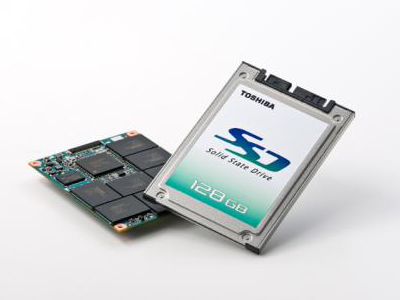Solid state storage closes in on HDDs

If there's one sentence we could have pre-written before this year's CES, it's this one: "Storage capacity increases". D'oh. Does Steve Jobs still wear tight jeans?
Hitachi is showing off a 500GB laptop hard drive, Samsung has a 9.55mm-high unit of the same capacity, and both Samsung and Toshiba announced 128GB solid state units for notebooks. Even Ridata has joined the fray with a 128GB 2.5-inch SSD model.
2008: the year of flash storage?
The interesting development, though, is not so much the ever-bigger numbers, but the increasing attractiveness of SSD as an alternative to hard drives.
But is Flash yet a viable alternative to hard disk drives - a 50-year-old technology?
We know about the speed advantages of SSD (the new Samsung 128GB model has a data writing speed of 70 MB/s - the highest yet for MLC-based SSDs). And we know about the reliability (lack of 'hard disc failure'), the power consumption benefits and reduced heat dissipation of SSD devices compared to their HD-based counterparts. But there are still obstacles to overcome.
A few laptop models by Asus, Dell, Fujitsu and Toshiba already make use of solid state drives. For now, though, their price makes them attractive only to early adopters.
Sign up for breaking news, reviews, opinion, top tech deals, and more.
There are still worries about the limited number of times that Flash-based memory can be used before data and capacity loss occurs. The most common Flash chips today have around 300,000 write cycles, while the best Flash chips have more like 1 million. Even though Flash-based drives should last several years, concerns over their longevity will only start to subside when manufacturers offer longer warranties.
There's life in the HDD yet
Samsung's new 128GB models - which feature a 3.0 gigabit-per-second SATA II interface and come in 1.8-inch and 1.5-inch flavours - claim an average time between failures of one million hours. The longevity of SSD is slowly improving and 'wear-levelling' technology is improved.
The CES 2008 announcements show that SSD is closing the gap with HD, and the cost per GB is coming down every year. The new 128GB models announced by Samsung and Toshiba will start mass production later this year.
2008 won't be a decisive year for solid state technology developing as an alternative to 'traditional' magnetic media. But the gap between the two looks set to get smaller. The time may well soon come for widespread adoption of SSD-based laptop and desktop computers by consumers and businesses. Don't touch that dial!